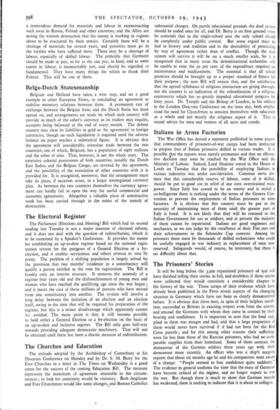The Churches and Education
The attitude adopted by the Archbishop of Canterbury at his Diocesan Conference on Monday and by Dr. S. M. Berry for the Free Churches in a letter in The Times on Wednesday is a good omen for the success of the coming Education Bill. The measure represents the maximum of agreement attainable in the circum- stances ; to look for unanimity would be visionary. Both Anglicans and Free Churchmen would like some changes, and Roman Catholics
substantial changes. On purely educational grounds the dual system should be ended once for all, and Dr. Berry is on firm ground when he contends that in the single-school area the only school should be completely under public control. But some regard must be had to history and tradition and to the desirability of proceeding by way of agreement rather than of conflict. Though the dual system will survive it will be on a much smaller scale, for it is recognised that in many areas the denominational authorities will be unable to raise the 5o per cent. of the expenditure required on maintenance and readjustment. The essential is that all school premises should be brought up to a proper standard of fitness for their purpose ; the new Bill will ensure that, and the satisfaction that the agreed syllabuses of religious instruction are giving through- out the country is an indication of the subordination of a religious controversy which has so-greatly impeded educational progress for forty years. Dr. Temple and the Bishop of London, in his address to the London Diocesan Conference on the same day, both empha- sised the need for Churchmen to concern themselves with education as a whole and not merely -the religious aspect of it. That is sound advice for men and women of all sects and creeds.


























 Previous page
Previous page